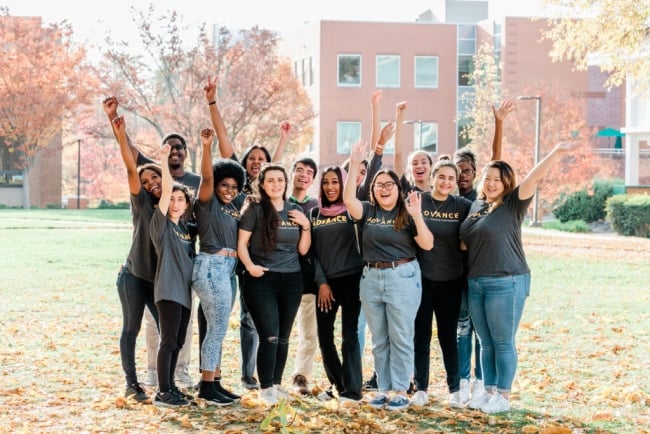You have /5 articles left.
Sign up for a free account or log in.

While participating in the ADVANCE program, students attend Northern Virginia Community College and have the privileges of George Mason University students.
GMU/NOVA
Upward transfer from community colleges to four-year institutions remains a challenge for students across the country as they map out their path academically, financially and personally. A partnership between two Virginia institutions helps increase student transfer and degree completion, plus reduces time to degree by providing wraparound supports and resources.
The ADVANCE program, co-created by Northern Virginia Community College and George Mason University, is a four-pronged initiative that facilitates transfer between the two institutions. Since launching in 2018, the program has helped over 4,500 community college students map out their path or successfully transfer to the university.
The background: In looking at data, NOVA leaders recognized that there are multiple challenges to transfer, including admission, financial aid, credit transfer and personal support, that can hinder a student’s decision to continue on to a bachelor’s degree.
To mitigate these challenges, ADVANCE has four goals—increase degree attainment (both associate and bachelor’s), decrease time to degree, decrease cost to degree and increase support for transfer.
“We know that in the transfer space, students who earn an associate degree before they transfer are more apt to persist and complete a bachelor’s degree, this whole idea of completion leading to completion,” said Jennifer Nelson, director of university transfer and initiatives at NOVA during Third Way’s Higher Ed Value Summit on May 14 in Washington, D.C.
How it works: The program has four components that help improve transfer: streamlined admission, defined curricular pathway, access to GMU and coaching.
NOVA students who have earned fewer than 30 credits can opt into ADVANCE. To remain in the program, students commit to earning an associate degree, maintaining at least a 2.5 (sometimes higher for certain programs) and completing required prerequisites depending on their program.
The program is not competitive and there is no cap on participation per semester, making it accessible to any student who meets the above criteria.
Once in ADVANCE, students do not have to complete an application to transfer to Mason, exempting them from the fee and the stress of an admissions cycle, but instead with guaranteed entry to their program of choice.
Students select between one of over 80 major pathways in the program, as well, which offers a detailed and clear transfer path on what credits they need to complete at the college and how that will apply to their bachelor’s degree.
Degree pathways range from business and tourism management roles to education and public service, along with health sciences, information technology and computer science, the liberal arts, and physical and life sciences, among others.
Additionally, each student receives a university ID, giving them access to all the services and resources at GMU, similar to a non–degree-seeking student. Students are “not only NOVA Nighthawks, but they’re also considered to be Mason Patriots,” Nelson said. “Essentially, our students get the best of both worlds.”
This helps familiarize students with GMU before transfer, helping to ease the change when they do transition so “they can hit the ground running,” Nelson said.
ADVANCE participants receive personalized coaches who guide them through the transfer process all along the way, serving as the primary point of contact for academic advising, matriculation and connecting students to resources at both institutions.
“They take a holistic approach to their work, understanding that what happens outside of the classroom has a direct impact on a student’s ability to excel inside of the classroom,” Nelson said.
The impact: The program has seen students retain at NOVA and successfully transfer to GMU, earning a bachelor’s degree at a higher rate than their peers nationally.
During fall 2021, 87 percent of ADVANCE students at NOVA retained from fall 2020, 16 percentage points higher than the national rate for community college students. Among students who had transferred, 96 percent retained from fall 2020 to 2021, 20 percentage points higher than their peers at other universities.
Ninety percent of ADVANCE students complete a bachelor’s degree at GMU in less than two years, on average two semesters faster and eight credits less than their peers who also transfer to GMU, saving students both time and money, Nelson said.
Part of the program’s success has been the partnership between the two institutions and their teams, Nelson said. “The individuals that work on this program are incredibly dedicated toward student success. Every decision that we’ve made with ADVANCE, from building the program to maintaining it, is a joint decision between the two institutions.”
Students remain the center of the ADVANCE program as well, with leaders annually soliciting participants for input about their experiences and making changes as needed.
In spring 2022, for example, students shared they wanted additional peer engagement opportunities following isolation from the COVID-19 pandemic.
“In response, ADVANCE created a Coordinator of Events and Communication position,” Nelson told Inside Higher Ed. “From the time the role was developed, there has been an increase in extra and co-curricular offerings and student participation in these areas.”
The program also has three standing committees, one of which is focused on curriculum, to regularly review existing program policy and provide recommendations for modifying or adopting new policy based on current needs, Nelson said.
If your student success program has a unique feature or twist, we’d like to know about it. Click here to submit.




